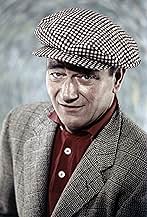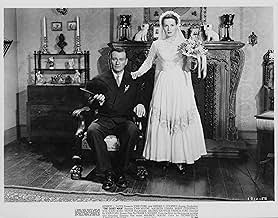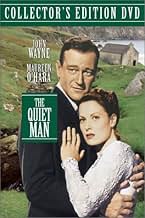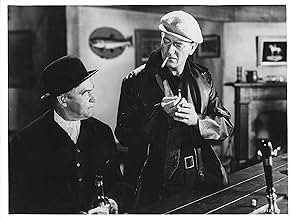Un boxeador estadounidense retirado regresa al pueblo donde nació, en la Irlanda de los años 20, donde se enamora de una pelirroja con mucho carácter, cuyo hermano desprecia su unión.Un boxeador estadounidense retirado regresa al pueblo donde nació, en la Irlanda de los años 20, donde se enamora de una pelirroja con mucho carácter, cuyo hermano desprecia su unión.Un boxeador estadounidense retirado regresa al pueblo donde nació, en la Irlanda de los años 20, donde se enamora de una pelirroja con mucho carácter, cuyo hermano desprecia su unión.
- Dirección
- Guión
- Reparto principal
- Ganó 2 premios Óscar
- 15 premios y 10 nominaciones en total
Charles B. Fitzsimons
- Hugh Forbes
- (as CHARLES fitzSIMONS)
James O'Hara
- Father Paul
- (as James Lilburn)
Sean McClory
- Owen Glynn
- (as Sean McGlory)
Jack MacGowran
- Ignatius Feeney
- (as Jack McGowran)
Reseñas destacadas
10huttfam5
What's not to like about this picture? A classic directed by the legendary John Ford. John Wayne and Maureen O'Hara light up the screen. Wayne's performance is brilliant, but what really stands out is that he is playing a regular guy with real feelings and emotions--no army uniforms, no indians to fight, no cavalry coming to the rescue--just a great performance. The supporting cast is unmatched--including great performances by Victor McLaglen, Barry Fitzgerald and Ward Bond. Look closely for Ken Curtis (Festus, from Gunsmoke) in an uncredited role. The scenery is absolutly breathtaking--it makes me want to go home to Ireland--and I'm not even Irish. To top it off The Quiet Man has the greatest fist fight ever captured on film. This is one of my two favorite John Wayne movies. The Duke should have gotten an Oscar for this one. Movie viewers won't be disapointed by this one.
I'll spare you with the plot description (others on this page have done so), but there are reasons why I love this film.
First, the performances. Wayne as the re-patriated Irish-American, O'Hara as the fiesty Mary Kate, Fitzgerald as the sly little old man, Bond as the strong-willed priest, and McLaglen as the blustering blow-hard. Directed by John Ford, they were unconquerable.
Second, the cinematography. The landscapes are lush and rolling. The interior shots are filled with little details that add so much to the scene. You can almost imagine what the Cohen's pub must smell like ("Over here, we pronounce it, CO-han!"). And in almost every shot, there is the color green.
Third, the writing and the lines. My family quotes the film like gospel. I was helping to move a bed into a house, and as I entered through the front door, I somberly spoke "God bless all here." We all got the joke.
Fourth, the music. So perfectly chosen and composed. It adds to each and every scene.
Fifth, the fight scene. A classic Irish donnybrook!
So many things about this film I cherish. Also, it's one of the few films that John Wayne doesn't shoot a gun! A marvelous, marvelous film! In their book "The Big Damn Book of Sheer Manliness", the Von Hoffman brothers called this film one of the "top 25 greatest guy movies of all time". Who am I to argue?
First, the performances. Wayne as the re-patriated Irish-American, O'Hara as the fiesty Mary Kate, Fitzgerald as the sly little old man, Bond as the strong-willed priest, and McLaglen as the blustering blow-hard. Directed by John Ford, they were unconquerable.
Second, the cinematography. The landscapes are lush and rolling. The interior shots are filled with little details that add so much to the scene. You can almost imagine what the Cohen's pub must smell like ("Over here, we pronounce it, CO-han!"). And in almost every shot, there is the color green.
Third, the writing and the lines. My family quotes the film like gospel. I was helping to move a bed into a house, and as I entered through the front door, I somberly spoke "God bless all here." We all got the joke.
Fourth, the music. So perfectly chosen and composed. It adds to each and every scene.
Fifth, the fight scene. A classic Irish donnybrook!
So many things about this film I cherish. Also, it's one of the few films that John Wayne doesn't shoot a gun! A marvelous, marvelous film! In their book "The Big Damn Book of Sheer Manliness", the Von Hoffman brothers called this film one of the "top 25 greatest guy movies of all time". Who am I to argue?
It's not only the fact that I'm actually from County Mayo in Ireland where most of the outdoor scenes from The Quiet Man were filmed in the summer of 1951, that makes it my favorite movie of all time. This film has damn near everything for everyone in it without being offensive to anyone (Though the occasional hypersensitive Irish person or Feminist or "Yank" might take unfounded offense at the various pokes of fun that are made at various traditions!)
For the romantics this has romance in abundance and probabaly some of the most famously erotic (and much copied - A further indication of how hight in esteem this movie is held) scenes ever put on celluoid (without ever more that an absolute minimum of bare flesh being exposed to satify the puritans). Steven Spielburg most famously gives the cottage kissing scene the nod in "ET" and it was said of the "Wet shirt" Graveyard kissing scene in the rain that, during the many takes it took to get it in the can, Director John Ford only got John Wayne to do everything he wanted to do to Maureen O'Hara himself.
For the action brigade it has probabaly the longest and one of the most enthralling fight scenes of any movie.
For the comics the entire film is laced with Irishisms and good humor and wild banter and loads of "craic"
For the weepies it has tragedy and death and a haunting from the past.
And for the pure sentimental including myself the film has my beautiful country lavishly and lovingly displayed in glorious technicholor compliments of Winston C Hoch amnd Archie Stout which deservedly won it an Oscar for cinematography.
And it has all this and more...
If one cares to delve deeper it touches on themes of Shakespeare (Taming of the Shrew) and the best traditions of Irish literature (JM Synge and WB Yeats).
Testament to it's greatness are the many books and documentries that have been created about it in it's wake (Try Des McHales "The Complete Guide to the Quiet Man" or Gerry McEntees' "In the footsteps of the Quiet Man" for starters!) along with the many tourist that still visit Cong, County Mayo in search of their own dream Inishfree.
I've lost count how many times I've seen this movie both in Ireland and in Exile both here in the US and in England, but suffice to say that at this stage I can now quote liberally from such classic lines as Feeney's: "Silence if you please, Parlimentary procedure, Squire Danagher has the floor" or Micheleen Og Flynn's "Homeric, impetious" upon viewing the marriage bed of Sean and Mary Kate and coming to his own conclusions on the events that may have occured in it.
After owning a variety of VHS (both Pal and US versions) of the movie I've finally purchaced the DVD also which allows one (If one so wishes) to watch every frame of the movie digitally remastered - If you are a fanatic like me or Quiet Maniacs as we are sometimes known this allows you to catch a glimpse of such things as a fly landing on Maureen O'Hara cheek during one shot or (In a daring unintentionally risque scene for the 1950's) her momentarially exposing her underwear whilst jumping over a trunk.
If you haven't seen this movie (and I'm increasing surprised how many of the younger Blockbuster New Release weaned movie viewers haven't) get yerself down to yer local video store now and look in the Classic Shelves for one of those classics that is sure to be there alongside Ben Hur, Gone with the Wind and Casablanca and rent it out for a great nights entertainment. Better still go and buy a copy 'cos once you've viewed it once like me you'll most likely be hooked and will want to watch it again and again (Even sometimes late at night, round Christmastime, sipping a hot Irish whiskey!)
For the romantics this has romance in abundance and probabaly some of the most famously erotic (and much copied - A further indication of how hight in esteem this movie is held) scenes ever put on celluoid (without ever more that an absolute minimum of bare flesh being exposed to satify the puritans). Steven Spielburg most famously gives the cottage kissing scene the nod in "ET" and it was said of the "Wet shirt" Graveyard kissing scene in the rain that, during the many takes it took to get it in the can, Director John Ford only got John Wayne to do everything he wanted to do to Maureen O'Hara himself.
For the action brigade it has probabaly the longest and one of the most enthralling fight scenes of any movie.
For the comics the entire film is laced with Irishisms and good humor and wild banter and loads of "craic"
For the weepies it has tragedy and death and a haunting from the past.
And for the pure sentimental including myself the film has my beautiful country lavishly and lovingly displayed in glorious technicholor compliments of Winston C Hoch amnd Archie Stout which deservedly won it an Oscar for cinematography.
And it has all this and more...
If one cares to delve deeper it touches on themes of Shakespeare (Taming of the Shrew) and the best traditions of Irish literature (JM Synge and WB Yeats).
Testament to it's greatness are the many books and documentries that have been created about it in it's wake (Try Des McHales "The Complete Guide to the Quiet Man" or Gerry McEntees' "In the footsteps of the Quiet Man" for starters!) along with the many tourist that still visit Cong, County Mayo in search of their own dream Inishfree.
I've lost count how many times I've seen this movie both in Ireland and in Exile both here in the US and in England, but suffice to say that at this stage I can now quote liberally from such classic lines as Feeney's: "Silence if you please, Parlimentary procedure, Squire Danagher has the floor" or Micheleen Og Flynn's "Homeric, impetious" upon viewing the marriage bed of Sean and Mary Kate and coming to his own conclusions on the events that may have occured in it.
After owning a variety of VHS (both Pal and US versions) of the movie I've finally purchaced the DVD also which allows one (If one so wishes) to watch every frame of the movie digitally remastered - If you are a fanatic like me or Quiet Maniacs as we are sometimes known this allows you to catch a glimpse of such things as a fly landing on Maureen O'Hara cheek during one shot or (In a daring unintentionally risque scene for the 1950's) her momentarially exposing her underwear whilst jumping over a trunk.
If you haven't seen this movie (and I'm increasing surprised how many of the younger Blockbuster New Release weaned movie viewers haven't) get yerself down to yer local video store now and look in the Classic Shelves for one of those classics that is sure to be there alongside Ben Hur, Gone with the Wind and Casablanca and rent it out for a great nights entertainment. Better still go and buy a copy 'cos once you've viewed it once like me you'll most likely be hooked and will want to watch it again and again (Even sometimes late at night, round Christmastime, sipping a hot Irish whiskey!)
Maureen O'Hara in Technicolor is surely any Irishman's dream, and "The Quiet Man" would be timeless for that alone. But O'Hara's performance is all the more indelible for the great good humor she bestows on her character, Mary Kate Danaher. Let's face it; with any other actress, this could have been a disaster.
Sean Thornton (John Wayne) comes back to County Mayo, his birthplace, to find a peace he lost tragically back home in America. He immediately discovers some old friends, and a new one, too, Mary Kate, who while herding sheep stares back at him in what James Joyce might have called "a significant manner."
Director John Ford elects to shoot O'Hara from an odd angle, and with an unusual overhead shadow crossing O'Hara's face, that in anyone else's hands would have totally blown the shot but here creates something, well, "Homerific." It's one of many amazing shots in a film that seems more painted than photographed, and is perhaps the most strikingly lovely film ever made.
The shot of O'Hara looking back at Wayne also clues you onto something else, that this is going to be her story as much as it is Thornton's. In fact, it's really more about her than it is about him, a film about romance and a woman's liberation at the hands of her lover. We call them "chick flicks" today. But since John Wayne is the nominal star and no one ever confused Ford with Douglas Sirk, "The Quiet Man" isn't popularly regarded this way.
It's fun to read all the comments about poor Mary Kate and how this film glamorizes the mistreatment of women. They have one thing right, it's a film about spousal domination, but it's the wife ruling the husband. Think about it: She makes her lover do just about everything he does in the film, even risk bodily injury at the hands of her brutish brother (she doesn't know about his past and thinks she married "a coward.") People complain that he drags her across a dung-covered field, while a helpful woman hands him a stick "to beat the lovely lady with." But of course it's Mary Kate who's in total control of the situation. She wants Thornton to fight for her, in every sense of the word, and won't make it easy. She wants him to adapt to her culture, rather than adapt to his. (She's not one to be "honked at," as she puts it.) It's not surprising she trips and falls at one point while Thornton pulls her across a field; probably one of those puppet strings of hers got in the way.
But there are worse things in life than being enslaved by the likes of Maureen O'Hara, like not being enslaved by the likes of Maureen O'Hara. She's not only beautiful and pure-hearted, but such a hilarious joy to be around. O'Hara plays up the comedy of her scenes very well; she could have opted for a more regal distance from the slapstick but plays it as rowdy as the rest instead. The scene when she spits in her hand before shaking with matchmaker Michaleen Flynn (Barry Fitzgerald, who gives the next-best performance after O'Hara) tells you who she is better than any of her many sexy moments on screen. It also gets back to the point of why she's so essential in this film. She is Ireland, the spirit of Erin, and you want her to win, not because she's so pretty but because you know she's good and right for Sean, too.
About the only things wrong with the film are the action sequences, the horse race and the fistfight between Sean and Mary Kate's brother. It's not because the scenes aren't terrific, but because they are so abbreviated, especially the fistfight, which feels likes its building to something even funnier and more rousing than what's come before when it just sort of stops. Ford apparently had to do some cutting to get his film in at the required length, and with his focus as much on Mary Kate as possible, probably preferred to trim the scenes that had the least to do with her. But since the focus on O'Hara is what makes the film anyway, this is a small matter. Wayne fans wanting more action will just have to content themselves with almost every other film the Duke ever made.
Seeing this film for the first time reminded me a lot of "Local Hero," the 1982 comedy. Not only is "The Quiet Man" also a fish-out-of-water story about an American in the British Isles (Scotland in "Local Hero"), both films maintain a very delicate balancing act between whimsy and pathos, with "The Quiet Man," siding on the former direction and "Local Hero" the latter. Definitely worth checking out the one if you saw and liked the other. But "Quiet Man" was there first.
Sean Thornton (John Wayne) comes back to County Mayo, his birthplace, to find a peace he lost tragically back home in America. He immediately discovers some old friends, and a new one, too, Mary Kate, who while herding sheep stares back at him in what James Joyce might have called "a significant manner."
Director John Ford elects to shoot O'Hara from an odd angle, and with an unusual overhead shadow crossing O'Hara's face, that in anyone else's hands would have totally blown the shot but here creates something, well, "Homerific." It's one of many amazing shots in a film that seems more painted than photographed, and is perhaps the most strikingly lovely film ever made.
The shot of O'Hara looking back at Wayne also clues you onto something else, that this is going to be her story as much as it is Thornton's. In fact, it's really more about her than it is about him, a film about romance and a woman's liberation at the hands of her lover. We call them "chick flicks" today. But since John Wayne is the nominal star and no one ever confused Ford with Douglas Sirk, "The Quiet Man" isn't popularly regarded this way.
It's fun to read all the comments about poor Mary Kate and how this film glamorizes the mistreatment of women. They have one thing right, it's a film about spousal domination, but it's the wife ruling the husband. Think about it: She makes her lover do just about everything he does in the film, even risk bodily injury at the hands of her brutish brother (she doesn't know about his past and thinks she married "a coward.") People complain that he drags her across a dung-covered field, while a helpful woman hands him a stick "to beat the lovely lady with." But of course it's Mary Kate who's in total control of the situation. She wants Thornton to fight for her, in every sense of the word, and won't make it easy. She wants him to adapt to her culture, rather than adapt to his. (She's not one to be "honked at," as she puts it.) It's not surprising she trips and falls at one point while Thornton pulls her across a field; probably one of those puppet strings of hers got in the way.
But there are worse things in life than being enslaved by the likes of Maureen O'Hara, like not being enslaved by the likes of Maureen O'Hara. She's not only beautiful and pure-hearted, but such a hilarious joy to be around. O'Hara plays up the comedy of her scenes very well; she could have opted for a more regal distance from the slapstick but plays it as rowdy as the rest instead. The scene when she spits in her hand before shaking with matchmaker Michaleen Flynn (Barry Fitzgerald, who gives the next-best performance after O'Hara) tells you who she is better than any of her many sexy moments on screen. It also gets back to the point of why she's so essential in this film. She is Ireland, the spirit of Erin, and you want her to win, not because she's so pretty but because you know she's good and right for Sean, too.
About the only things wrong with the film are the action sequences, the horse race and the fistfight between Sean and Mary Kate's brother. It's not because the scenes aren't terrific, but because they are so abbreviated, especially the fistfight, which feels likes its building to something even funnier and more rousing than what's come before when it just sort of stops. Ford apparently had to do some cutting to get his film in at the required length, and with his focus as much on Mary Kate as possible, probably preferred to trim the scenes that had the least to do with her. But since the focus on O'Hara is what makes the film anyway, this is a small matter. Wayne fans wanting more action will just have to content themselves with almost every other film the Duke ever made.
Seeing this film for the first time reminded me a lot of "Local Hero," the 1982 comedy. Not only is "The Quiet Man" also a fish-out-of-water story about an American in the British Isles (Scotland in "Local Hero"), both films maintain a very delicate balancing act between whimsy and pathos, with "The Quiet Man," siding on the former direction and "Local Hero" the latter. Definitely worth checking out the one if you saw and liked the other. But "Quiet Man" was there first.
One of the best directed by John Ford. An emotional, humorous look at an American, played by John Wayne, going back to his native Ireland and trying to fit in with the present culture. Sensational scenery and the grand music by Victor Young support this classic among classics. Breezy and rowdy. Too beautiful to turn your back on. A great illustration of romance. The interaction between Wayne and Maureen O'Hara is magical and hard to beat.
Other classic performances are turned in by Victor McLaglen, Ward Bond and Barry Fitzgerald.
Other classic performances are turned in by Victor McLaglen, Ward Bond and Barry Fitzgerald.
¿Sabías que...?
- CuriosidadesAt the film's conclusion, after the credits, we see Kate and Sean standing in their garden waving good-bye. Maureen O'Hara turns to John Wayne and whispers something in his ear, evoking a priceless reaction from Wayne. What was said was known only to O'Hara, Wayne and director John Ford. In exchange for saying this unscripted bit of text, O'Hara insisted that the exact line never be disclosed by any involved parties. In her memoirs she says that she refused to say the line at first as she "couldn't possibly say that to Duke", but Ford insisted, claiming he needed a genuine shock reaction from Wayne. The line remains a mystery to this day.
- PifiasBefore Sean enters Mary Kate's home to ask her brother's permission to court her, the flowers he's carrying are very sad looking. After he enters the house, they change into a nice, full, colorful bouquet.
- Citas
Mary Kate Danaher: Could you use a little water in your whiskey?
Michaleen Flynn: When I drink whiskey, I drink whiskey; and when I drink water, I drink water.
- ConexionesFeatured in Directed by John Ford (1971)
- Banda sonoraThe Wild Colonial Boy
(uncredited)
Traditional
Adapted by Sean O'Casey and Dennis O'Casey
Performed by John Wayne, Ken Curtis, and Francis Ford and others in the Pub
Reprised a cappella by Wayne and Victor McLaglen
Selecciones populares
Inicia sesión para calificar y añadir a tu lista para recibir recomendaciones personalizadas
Detalles
Taquilla
- Presupuesto
- 1.750.000 US$ (estimación)
- Duración
- 2h 9min(129 min)
- Relación de aspecto
- 1.37 : 1
Contribuir a esta página
Sugerir un cambio o añadir el contenido que falta

































